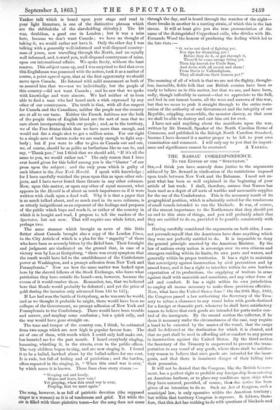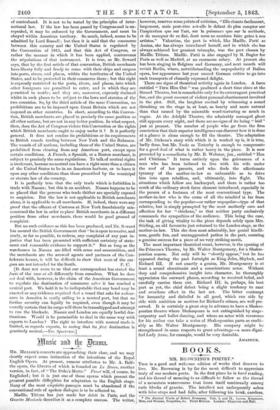THE NASSAU CORRESPONDENCE.
To THE EDITOR OF THE " SPECTATOR."
think you have scarcely done justice to the arguments adduced by Mr. Seward in vindication of the restrictions imposed upon trade between New York and the Bahamas. I need not re- peat what has been so well explained in the beginning of your article of last week. I shall, therefore, assume that Nassau has been used as a depot of all sorts of warlike and mercantile supplies for the use of the Confederates. This is the necessary result of its geographical position, which is admirably suited for the rendezvous of small vessels intended to run the blockade. It was, of course, of the utmost importance to the Northerners that they should put an end to this state of things, and you will probably admit that they are entitled to do so, provided it be possible consistently with law.
Having carefully considered the arguments on both sides, I can- not persuade myself that the Americans have done anything which they were not perfectly entitled to do. It is impossible to deny the general principle asserted by the American Minister. By the law of nations every nation is sovereign over its own citizens and strangers residing within its limits, its own ports and waters, and generally within its proper territories. It has a right to maintain that sovereignty against insurrection by civil preventives and by armed force, and it has a right to interdict within its own borders exportation of its productions, the supplying of traitors in arms against itself with materials and munitions, and any other form of aid and comfort. It has a right within its own jurisdiction to employ all means necessary to make these provisions effective Now, what have the United States done ? On the 20th May, 1862, the Congress passed a law authorizing the Secretary of the Trea- sury to refuse a clearance to any vessel laden with goods destined for a foreign or domestic port, whenever he shall have satisfactory reason to believe that such goods are intended for ports under con- trol of the insurgents. By the second section the collector, if he deem it necessary under the circumstances of the case, may require a bond to be executed by the master of the vessel, that the cargo shall be delivered at the destination for which it is cleared, and that no part shall be used in affording aid or comfort to any person in insurrection against the United States. By the third section the Secretary of the Treasury is empowered to prevent the trans- portation in any vessel of any goods, where there shall be satisfac- tory reason to believe that such goods are intended for the insur- gents, and that there is imminent danger of their falling into their possession.
It will not be denied that the Congress, like the British Govern- ment, has a perfect right to prohibit any foreign ship from entering an American harbour, or to place any conditions upon ships when they have entered, provided, of course, than due notice has been given of an intention to do so. Such an Act of Congress, such a municipal law, is only operative within the American territory ; but within that territory Congress is supreme. It follows, there- fore, that this Act has nothing to do with questions of blockade and of contraband. It is not to be tested by the principles of inter- national law. If the law has been passed by Congress and is un- repealed, it may be enforced by the Government, and must be obeyed within American territory. So much, indeed, seems to be admitted by Lord Russell ; but then it is said that the commerce between this country and the United States is regulated by the Convention of 1815, and that this Act of Congress, or rather the manner in which it has been applied, contravenes the stipulations of that instrument. It is true, as Mr. Seward says, that by the first article of that convention, British merchants have liberty fully and freely to come with their ships and cargoes into ports, rivers, and places, within the territories of the United States, and to be protected in their commerce there ; but this right is expressly restricted to the ports, rivers, and places, into which other foreigners are permitted to enter, and in which they are permitted to reside ; and they are, moreover, expressly declared whilst in such places to be subject to the laws and statutes of the two countries. So, by the third article of the same Convention, no prohibitions are to be imposed upon Great Britain which are not imposed on other countries. In short, according to this Conven- tion, British merchants are placed in precisely the same position as all other nations, but are not in any better position. In what respect, then, does the Act of Congress violate this Convention or the rights which British merchants ought to enjoy under it ? It is perfectly general. It does not confine its prohibitions or its requirements to British vessels trading between New York and the Bahamas. The vessels of all nations, including those of the United States, are prohibited from clearing from any American port, except upon certain conditions. A French, a Spanish, or a Boston merchant, is subject to precisely the same regulations. To talk.of neutral rights is irrelevant, because no neutral can have a right more than a citizen of the United States to be in an American harbour, or to leave it upon any other conditions than those prescribed by the municipal or statute law of the country.
It is perfectly true that the only trade which is forbidden is trade with Nassau; but this is an accident. Nassau happens to be so placed that the .persons who trade thither are specially exposed to suspicion. But the law is not applicable to British merchants alone, it is applicable to all merchants. If, indeed, there were any proof that the officers of Customs at New York fraudulently mis- construed the law in order to place British merchants in a different position from other merchants, there would be good ground of complaint.
But no such evidence as this has been produced, and Mr. Seward has assured the British Government that "he is open to receive, and ready, as far as possible, to redress, any complaint of any past in- justice that has been presented with sufficient certainty of state- ment and reasonable evidence to support it." But as long as the warehouses in Nassau are filled with arms and ammunition, and the merchants are the avowed agents and partners of the Con- federate houses, it will be difficult to show that most of the car- goes are not intended for the South. P. C.
[It does not seeni to us that our correspondent has stated the facts of the case at all differently from ourselves. What he does not deal with, however, is the claim of the American Government to regulate the destination of commerce after it has reached a neutral port. We hold it to be indisputable that any bond may be exacted or any evidence required that a vessel that asks for a clear- ance in America is really sailing to a neutral port, but that no further security can legally be required, even though it may be morally certain that its cargo will there be transshipped and attempt to run the blockade. Nassau and London are equally lawful des- tinations. Would it be permissible to deal in the same way with exports to London ? The right to interfere with neutral trade is limited, as regards exports, to seeing that its first destination is genuinely neutral.—En. Spectator.]































 Previous page
Previous page